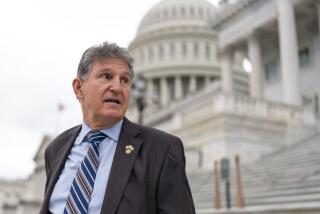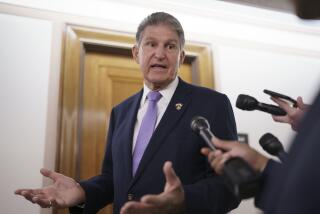Halt to Health Care Action for Year Urged : Legislation: Rep. Dingell, a Clinton ally, says it is time to give reform ‘a decent burial.’ Mitchell may reassess chances of his modest bill.
- Share via
WASHINGTON — One of President Clinton’s most powerful and influential congressional allies called upon him Tuesday to abandon the effort for the year, saying: “It is time to give health care reform a decent burial.”
The appeal by House Energy and Commerce Committee Chairman John D. Dingell (D-Mich.), which was made in a letter to the President, marked the first time that one of the stalwarts of the campaign has acknowledged publicly what has been obvious for weeks--that the end is near.
Indeed, even Senate Majority Leader George J. Mitchell (D-Me.) appeared to be preparing himself for the inevitable, although he was continuing his efforts to produce drastically scaled-back legislation with a bipartisan clique of senators who bill themselves as the “Mainstream Group.”
Mitchell said that in the next day or two, he plans to reassess the more modest bill’s chances in light of increasingly strident GOP opposition and the defection of many of the groups that had supported the health effort to date.
“I don’t believe we should bring a bill up if there’s certain defeat,” Mitchell said.
Mitchell cited statements by Senate Minority Leader Bob Dole (R-Kan.) and House Minority Whip Newt Gingrich (R-Ga.). During a meeting with Clinton on Tuesday, the two GOP leaders warned that if Democrats persisted in their efforts to produce a health bill, they risked losing international trade legislation as well.
While the comments raised the stakes, they also had the potential of putting Dole and Gingrich in the position of being blamed for the demise of health reform, if Congress’ failure to produce legislation sparks a public backlash. Thus far, however, lawmakers say voters appear more relieved than alarmed at the apparent failure.
Dingell’s letter was particularly poignant, given his enormous emotional investment in the issue. Over a half-century ago, his father and predecessor in Congress helped write the first national health insurance legislation, and the younger Dingell has continued to introduce versions of that bill at the beginning of every Congress since he took his father’s place in the mid-1950s.
Dingell’s efforts to forge a compromise in his own committee were one of the early danger signs of how difficult Clinton’s effort to overhaul the health care system would be. After months of struggle, Dingell finally threw in the towel.
“While I recognize that the Senate majority leader is still involved in efforts to craft health reform legislation, experience teaches clearly that the time has passed for consideration of any health reform measure this year,” Dingell wrote. “ . . . It is time for us to accept the fact that the health insurance industry, an assortment of small and large freeloaders, ideologues and their allies in the Congress have succeeded in their goal: preserving a status quo in which they prosper while millions of Americans suffer and our economy and competitiveness are made vulnerable.”
However, Dole rejected the suggestion that special interests were responsible for the demise of the effort. He told reporters that it had been brought down by “the American people. . . . They did the right thing.”
Although Dingell expressed hope for a “renewed effort to achieve meaningful reform next year,” the November elections are likely to produce stronger Republican contingents in the House and Senate--which is not conducive to the sort of legislation that Dingell would like to see.
Mitchell and his allies are trying to agree on a bill that would make widely agreed upon changes in insurance practices, such as ending the practice of denying coverage to those who have poor health records, and would rely upon incentives and subsidies to cover up to 94% of the population, or about 9% more than have health insurance now.
However, consumer groups warn that it would also have the undesirable consequence of boosting health premiums overall. “The so-called Mainstream proposal would do more harm than good,” said Gail Shearer, manager of policy analysis for Consumers Union.
The effort that Mitchell is leading is not the only one under way. A group of liberal senators is working on a plan aimed at expanding coverage of children and pregnant women, and Senate Finance Committee Chairman Daniel Patrick Moynihan (D-N.Y.) is also struggling to produce a modest plan.
* FEDERAL PLAN IMPROVES: Federal health coverage will be increased and costs cut. A16
More to Read
Sign up for Essential California
The most important California stories and recommendations in your inbox every morning.
You may occasionally receive promotional content from the Los Angeles Times.













